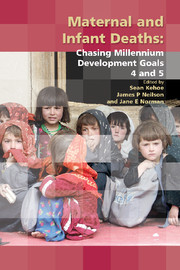Book contents
- Frontmatter
- Contents
- Participants
- Declaration of personal interests
- Preface
- The Millennium Development Goals
- SECTION 1 THE SIZE OF THE PROBLEM
- SECTION 2 CLINICAL PROBLEMS AND SOLUTIONS – MATERNAL
- SECTION 3 CLINICAL PROBLEMS AND SOLUTIONS – NEONATAL
- SECTION 4 TRAINING AND DEVELOPMENT
- SECTION 5 SPECIFIC CHALLENGES IN SPECIFIC COUNTRIES
- 17 Challenges faced in Afghanistan
- 18 Challenges faced in Zimbabwe
- 19 How Egypt has overcome the challenges
- 20 Learning from the achievements in Sri Lanka
- SECTION 6 CONSENSUS VIEWS
- Index
17 - Challenges faced in Afghanistan
from SECTION 5 - SPECIFIC CHALLENGES IN SPECIFIC COUNTRIES
Published online by Cambridge University Press: 05 February 2014
- Frontmatter
- Contents
- Participants
- Declaration of personal interests
- Preface
- The Millennium Development Goals
- SECTION 1 THE SIZE OF THE PROBLEM
- SECTION 2 CLINICAL PROBLEMS AND SOLUTIONS – MATERNAL
- SECTION 3 CLINICAL PROBLEMS AND SOLUTIONS – NEONATAL
- SECTION 4 TRAINING AND DEVELOPMENT
- SECTION 5 SPECIFIC CHALLENGES IN SPECIFIC COUNTRIES
- 17 Challenges faced in Afghanistan
- 18 Challenges faced in Zimbabwe
- 19 How Egypt has overcome the challenges
- 20 Learning from the achievements in Sri Lanka
- SECTION 6 CONSENSUS VIEWS
- Index
Summary
Introduction
In 2002, a report by UNICEF and the Centers for Disease Control and Prevention (CDC) concluded that ‘Afghanistan is among the worst places on the globe in which to be pregnant’. This conclusion was reached following review of preliminary data from a large well-designed maternal mortality study conducted from 1999 to 2002 that was subsequently published in the Lancet and that reported an overall maternal mortality ratio () of 1600 maternal deaths per 100000 live births (95% CI 1100—2000). Maternal death was the leading cause of death in women of reproductive age (15—49 years) and the MMRs were among the highest in the world. In the district of Ragh in Badakhshan province, the MMR was the highest ever recorded at 6507 per 100000 live births. The study concluded that 87% of these deaths were ‘preventable’ and that maternal death was intimately linked to neonatal death (74% of babies born alive to mothers who died also died).
In 2003, my husband and I left the UK for Kabul, Afghanistan, to work with Medair (www.medair.org), a Swiss-based humanitarian relief and rehabilitation organisation. Eric took up the position of country director and I, after a short language course, moved to Ragh to begin developing Essential Obstetric Care (EOC) services in four Medair clinics as part of their Primary Health Care programme. In the ensuing months, I experienced first-hand what life was like for women in these remote villages.
- Type
- Chapter
- Information
- Maternal and Infant DeathsChasing Millennium Development Goals 4 and 5, pp. 257 - 272Publisher: Cambridge University PressPrint publication year: 2010
- 1
- Cited by

